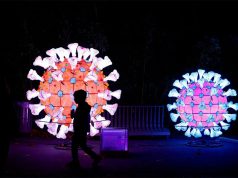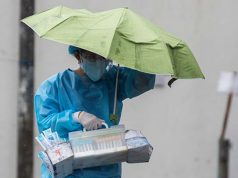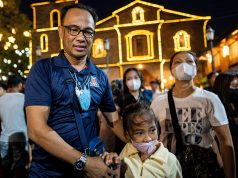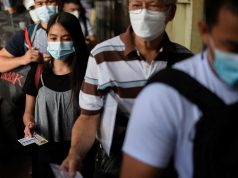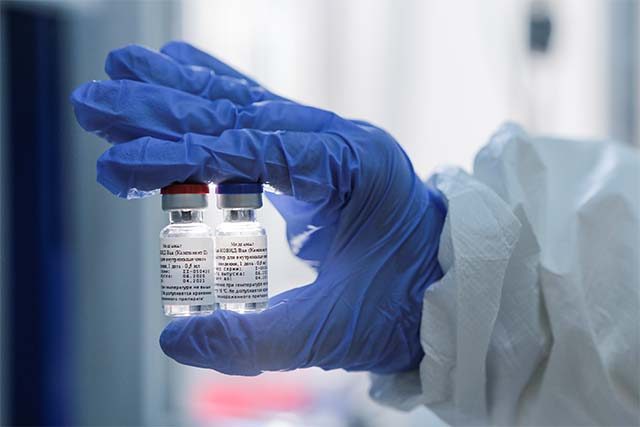
Some Filipinos cautioned their fellow citizens to be wary of the newly-approved COVID-19 vaccine of a Russian research institute after scientists raised alarms on its market availability despite the need to complete the final stage testing.
Medical student Gabriel Guevarra claimed that there is a “misplaced optimism” about Sputnik V, the world’s supposedly first vaccine against the coronavirus disease that has spurred a pandemic.
The vaccine is developed by the Gamaleya Research Institute of Epidemiology and Microbiology in Moscow and was announced to be approved by Russia’s health ministry on Tuesday despite undergoing less than two months of human testing.
Reports note that the Russian government said the vaccine had shown “high efficacy and safety” and that there were no side effects. They also suggested that it would make one reportedly immune from COVID-19 for two years.
Russian President Vladimir Putin said that one of his adult daughters has received the vaccine and experienced a rise in body temperature two times but that was it.
The vaccine was approved before it finished its third phase of clinical trials, considered the most “critical” phase in vaccine development wherein its effectivity is fully determined before mass distribution.
RELATED: Russia approves first COVID-19 vaccine, Putin says
Switzerland-based Filipino physician-scientist Melvin Sanicas, who specializes in infectious disease and global health, said that mass production of this vaccine is expected next month.
When will mass production of #Sputnik_V #vaccine start?
Mass production is expected to start in September 2020. Will the vaccine be available in other countries? ~20 countries had expressed interest including UAE, Saudi Arabia, Indonesia, Philippines, Brazil, Mexico, India.— Dr. Melvin Sanicas 🩺🔬 (@Vaccinologist) August 11, 2020
Guevarra in a Facebook post warned his fellow Filipinos about being “optimistic” about the vaccine and reminded them that it is “just starting” with Phase III.
He added that while other vaccine candidates developed by Moderna, Sinopharm and Oxford have already reached the third phase of trials, they are still not approved for commercial use.
“Putin approving and bragging about this even if clinical trials haven’t concluded yet is all for geopolitical clout,” Guevarra said.
He also shared an infographic released in the 14th edition of the “Basic & Clinical Pharmacology” which illustrates a timeline of vaccine development.
PH media has misplaced optimism on the Sputnik V vaccine developed by Moscow’s Gamelaya Institute. Hate to break it to…
Posted by Gabriel Jeremiah Tuason Guevarra on Tuesday, August 11, 2020
Another Filipino echoed Guevarra’s sentiments and reminded the public to keep their hopes “in check” with the Russian vaccine.
“Promising, yes, but it has yet to be published with no peer reviews conducted. No one knows if it is safe,” he said on Twitter.
“Hmm.. not to rain on everybody’s parade, but I’ve read that it was approved before completing the phase-three trial, w/c (which) experts consider essential, sooo idk (I don’t know). I mean, is it really 100% safe?” wondered another Twitter user.
Experts’ opinions
Dr. Faheem Younus, an award-winning infectious diseases specialist at the University of Maryland Upper Chesapeake Health, said that the Sputnik vaccine was only “tested on 76 volunteers.”
“A good vaccine is tested on 20,000-30,000 volunteers. We don’t know (its) exact safety/efficacy. But we DO KNOW that for vaccines, it’s more important (to) be right than to be first,” he tweeted.
A non-profit group monitoring worldwide vaccine clinical trials likewise warned the Philippine government to be wary of the Sputnik vaccine and proceed with the ongoing clinical trials with “caution.”
“There was no Phase 3 trial (prior to registering the drug) and that in some way, the Philippines decided that the Phase 3 trial is to be done there,” TrialSite, the group, said.
“Russia skipped that entire step,” it said to The Filipino Connection.
“This introduces risk and hence why we suggest caution to the Philippines, a country we care about,” the group added.
Experts from the global community have raised concerns about the Sputnik vaccine for fear of its safety and effectiveness as it has not yet completed the trial period required for vaccines.
It was announced that Phase III would only be commenced on August 12 with the participation of more than 2,000 people from Russia, the United Arab Emirates, Saudi Arabia, Brazil, and Mexico.
Moscow-based Association of Clinical Trial Organizations had previously written an open letter to Russia’s health ministry and urged it to delay the approval of Sputnik until all of the data in Phase III was recorded.
Science News likewise said that there is still “no published information” available about its safety and efficacy.
It also cited Walter Orenstein, associate director of the Emory Vaccine Center, who said that Phase III trials would’ve allowed researchers to uncover rare side effects that might not show up in smaller studies.
Daniel Kuritzkes, virologist and infectious diseases doctor at Brigham and Women’s Hospital, mentioned that the third phase is where scientists would be watching if the antibodies against the vaccine wouldn’t make the disease work, unlike with dengue.
The World Health Organization said that it is in “close contact with Russian authorities” to review Sputnik’s vaccine safety data.
For review by Philippine officials
Meanwhile, Philippine government officials assured the public that Sputnik will be assessed once it reaches Manila.
Food and Drug Administration Director General Eric Domingo said that the agency “will evaluate it accordingly” and added that it would only be approved if the vaccine has been used in widespread testing.
Philstar.com reported that Sputnik is only listed as being in Phase 1 in the latest draft landscape of COVID-19 vaccines published by WHO.
Health Undersecretary Maria Rosario Vergeire also said that the Russian-made vaccine will undergo regulatory process once it reaches the Philippines.
“We can ensure the public na atin itong padaanin sa procedures natin here even though dumaan na ‘yan sa regulatory procedure sa Russia,” she said in a media forum.
The Department of Science and Technology is set to meet with the Gamaleya Institute and discuss the vaccine.
“Uumpisahan ngayong araw ang pakikipag-usap para makita natin kung ano mang meron ang bakunang ito upang mapag-aralan at makapag-bigay ng rekomendasyon sa ating presidente,” Vergeire said.
Presidential spokesperson Harry Roque said that while President Rodrigo Duterte has offered to risk his life in taking a vaccine shot, it will depend on the Presidential Security Group who is tasked to provide close-in security to him.
“It was perfectly fine for him to offer it because that’s his way of telling the people that ‘I want us to have a vaccine and if I have to be a guinea pig for it, I don’t mind.’ Because that’s the attitude of the president. He’s old, he’s at the end of his term, he can sacrifice his life for the Filipino people,” Roque said, as quoted by reports.
“But as to whether or not the PSG (Presidential Security Group) will actually allow him is a different thing,” he added.
Duterte, who has consistently aired his eagerness for a release of a COVID-19 vaccine, previously offered his willingness to participate in Russia’s trials in his last national address and hoped that the Philippines would be “COVID-free” by December.
On Wednesday, Reuters reported that the first batch of Russia’s COVID-19 vaccine would be ready for some medics within two weeks.
Russia also rejected the safety concerns aired by some experts over Moscow’s rapid approval of the drug as “groundless.”




